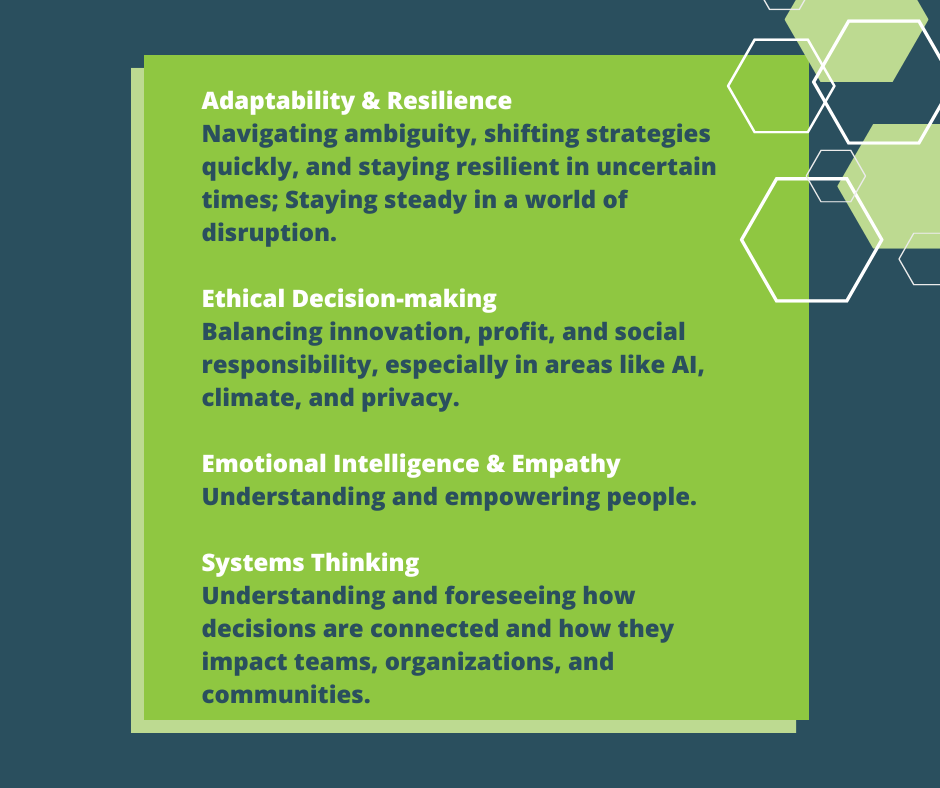Skills for Social Impact: What Tomorrow’s Leaders Need to Learn Today
Each year as we prepare for the arrival of summer interns, enFocus provides professional development training covering the shift to supervision, developing a leadership mindset, and leadership styles. For many on our team, managing a project with interns is the first opportunity they will have had to formally supervise someone. As a first time supervisor, most will focus on communication, setting clear expectations, and delegating tasks. And while this is a great place to start, leadership is about so much more than supervisory skills. As our world becomes more complex daily and traditional job functions are replaced with artificial intelligence (AI), a strong leader needs to be adept in new and different ways to meet the needs of today, tomorrow, and the years ahead.
Leadership is the ability to inspire, guide, and empower others toward a shared vision or goal, while creating the conditions for people and organizations to thrive.
Effective leadership has never been more important—or more complicated. As computer scientist Grace Hopper famously said, “You manage things, you lead people.” In today’s ever changing world, the difference between managing and leading has never been clearer.
Managers keep systems running. Leaders create the vision, inspire others, and guide people through uncertainty. The leaders of tomorrow won’t just be defined by titles or corner offices— their ability to adapt, empathize, and connect in ways that spark real change will shape their teams, organizations, and even communities.
“The manager asks how and when; the leader asks what and why.”
In the past, leadership often meant command and control. Today, it means collaboration, creativity, and resilience. Global challenges, rapid technological change, and increasingly diverse workplaces are redefining what it takes to be effective, including:
Adaptive, Values-Driven Systems Leadership
Today’s leaders need the ability to stay steady amid uncertainty, make principled choices, and understand how decisions impact a team, department, organization, and those they serve. It’s important for leaders to know, live, and promote the mission and values of the organization. Doing so allows leaders to flex with rapid change while staying anchored in purpose.
Effective leaders balance innovation with integrity. They can zoom out to see whole systems—teams, organizations, and regions—and then zoom in to act with clarity and accountability. Leaders who can navigate complexity with confidence, make ethical decisions when the stakes are high, and design solutions that strengthen the entire ecosystem will be successful leaders now and in the future.
Human-Centered Communication & Influence
Leaders who communicate with intention, foster belonging, and inspire teams to move together toward meaningful impact are able to turn ideas into action. Leaders skilled in human-centered communications and influence bridge cultures, inspire action, and build trust across every kind of team — hybrid, remote, in-person, and global.
Leaders who can translate a vision into a story people want to be part of will inspire their team. They listen deeply, communicate clearly, and adapt their message to meet people where they are. They understand that influence isn’t about authority — it’s about connection, clarity, and shared purpose. Leaders don’t succeed alone — they mobilize others. Whether in-person, across cultures, or on a screen, the ability to inspire, influence, and grow people is essential.
Tech-Powered, Future-Ready Leadership
Leaders need to guide organizations through a world driven by data, innovation, and sustainability with technical and strategic fluency. They leverage technology wisely, make informed decisions, and build a future that’s innovative, ethical, and sustainable for people and the planet.
This is the skillset of leaders who not only understand emerging technologies — from AI to advanced analytics — but also know how to use them responsibly. They pair data with human judgment, mentor others to grow into their potential, and design solutions with long-term environmental and economic stewardship in mind.
These skills aren’t theoretical—they’re lived. They’re forged in real-world problem solving, where decisions matter and outcomes affect communities and people. It’s built through experience: leading projects, collaborating across sectors, working under pressure, and reflecting on successes and failures.
That’s why programs like the enFocus Fellowship exist. Fellows don’t just gain technical skills; they practice leadership daily—designing solutions for real challenges in healthcare, education, government, and beyond. They learn how to navigate ambiguity, influence stakeholders, and inspire action. In short, they’re preparing to be the leaders every community and organization will need. Future leaders won’t just emerge at the executive level—they are being built in classrooms, labs, nonprofits, startups, and communities right now.
The Future is Waiting
The future is defined by uncertainty — global disruptions, new technologies, and climate challenges. Leaders need to stay steady, make tough tradeoffs, and think beyond short-term wins to long-term impact. Leadership is not about being in charge—it’s about taking care of those in your charge. The future needs leaders who can adapt, empathize, and innovate. The question is: where will those leaders be built?
For many, the answer starts with the enFocus Fellowship.




